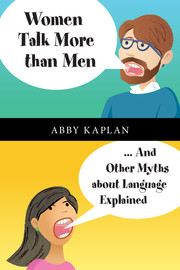Book contents
- Frontmatter
- Contents
- List of figures
- List of tables
- Acknowledgments
- 1 Introduction
- Part I … But is it language?
- Part II Language learning
- Part III Language in use
- 8 ‘Women talk more than men’
- 9 ‘Texting makes you illiterate’
- 10 ‘The most beautiful language is French’
- 11 ‘My language limits my thoughts’
- Appendix A Statistics brief reference
- Language index
- People index
- General index
10 - ‘The most beautiful language is French’
from Part III - Language in use
Published online by Cambridge University Press: 05 April 2016
- Frontmatter
- Contents
- List of figures
- List of tables
- Acknowledgments
- 1 Introduction
- Part I … But is it language?
- Part II Language learning
- Part III Language in use
- 8 ‘Women talk more than men’
- 9 ‘Texting makes you illiterate’
- 10 ‘The most beautiful language is French’
- 11 ‘My language limits my thoughts’
- Appendix A Statistics brief reference
- Language index
- People index
- General index
Summary
We use language in many ways: as a practical tool, to communicate ideas; as a social tool, to maintain relationships and mark our identity; as an artistic tool, in poetry, prose, drama, songs, and so on. For many people, using a particular language, or using language in particular ways, goes right to the heart of who they consider themselves to be. Small wonder, then, that so many people have strong opinions about language.
Within a particular language, people argue about whether it's better to use this word or that word, about whether it's okay to use a particular grammatical construction, about how the language should be written, about how to construct a poem or a speech or a contract. Considering languages as wholes, it's common to find claims that a specific language (or dialect of a language) is especially logical, or primitive, or poetic, or spiritual. Ideas like these have been used to argue that certain languages are particularly fit (or unfit) for specific uses, such as science or art.
In this chapter, we will focus on aesthetic judgments of languages: the idea that a language itself (not just an artistic use of that language) can be beautiful or ugly. Along the way, we'll touch on similar descriptions of languages as especially pleasant, clear, or logical – essentially, any kind of broad, handwavy judgment about a language or dialect as a whole. We will explore the factors that inform these judgments: To what extent are they a reaction to intrinsic properties of the language itself? To what extent are they related to the language's historical and cultural associations? To what extent are they affected by our beliefs about the people who speak the language?
Non-linguists’ evaluations of dialects
We will begin by investigating what people believe about the dialects of their native language. Traditionally, the field of dialectology has involved linguists traveling to different areas and recording the range of variation within a single language. The goal is to document, as accurately as possible, what the dialects of a language are and how they differ from each other. For this reason, dialectologists focus on recording the speech of actual speakers of each dialect, rather than relying on speakers of other dialects to describe the situation: popular beliefs are often inaccurate.
- Type
- Chapter
- Information
- Women Talk More Than Men... And Other Myths about Language Explained, pp. 216 - 234Publisher: Cambridge University PressPrint publication year: 2016

